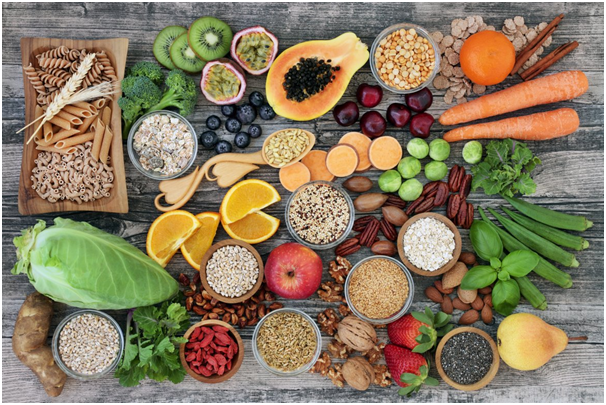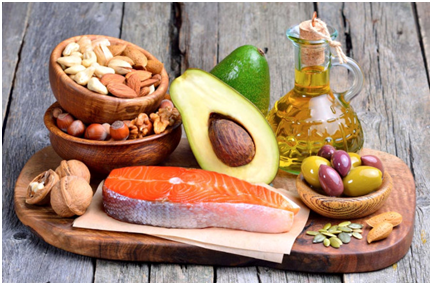– by Pirunrat Nathchayanonth (Yori), Client Coordinator
I’m not a mother yet myself, but many of my friends are having children and they all say one thing in common – the most crucial stages of your child’s development is between born and 3 years old.
Other than worrying about how much liquid gold you can produce, after 6 months your baby will likely be ready to have some form of solid food with sufficient nutrients.

What are nutrients and why are they good for you?
Nutrients are the substances in food that our bodies process to enable it to function. Your nutrient requirements are influenced by factors including your age, growth stage and activity. Nutrients are so small that the naked eye can’t see them.
Nutrients can generally be broken into two categories:
- macronutrients – carbohydrates, protein, fats; and
- micronutrients – vitamins and minerals such as calcium, iron, vitamin C.
Macronutrients make up a majority of our diets and provide energy for us to move and function. Micronutrients, on the other hand, are chemical substances that we require in small amounts for healthy growth and development.
THE IMPORTANCE OF CARBOHYDRATES FOR YOUNG CHILDREN
Carbs fuel your child’s metabolism, feed their brain and are vital for the development of the nervous, immune, and digestive systems. They are also a quick energy source.
Ways to include carbohydrates in your child’s diet:
- Fresh fruit
- Carrot, cucumber, capsicum and celery as veggie sticks
- Rolled oat porridge
- Roasted potato or sweet potato
- Sourdough or rye bread
- Legumes
- Pasta
- Whole grains such as wild rice, millet, quinoa and barley

THE IMPORTANCE OF PROTEINS FOR YOUNG CHILDREN
Protein is required to build cell and tissue structure, for muscle function, hormone signaling, the transport of blood, to build antibodies and for the digestion of food. Protein is also important for your child’s energy levels and sleeps quality.
Protein is made up of 20 amino acids. Of these, 9 are essential, meaning the body can’t make them and you will have to get them from your diet. You will find a wide variety of “complete” protein sources in animal products such as meat, fish, eggs and dairy products. “Incomplete” protein, on the other hand, are protein-containing plant foods such as legumes, nuts, seeds and quinoa. Both can have their place in a healthy diet.
For vegetarian and vegan children, including a variety of incomplete protein sources throughout the day will help ensure your child has an adequate protein intake. Depending on the rest of your child’s diet, you may need supplementation (particularly vegans). Best to speak to your health practitioners such as a pediatrician or nutritionist before embarking on their restrictive diets to avoid any essential nutrient deficiencies.
Ways to include protein in your child’s diet:
- Eggs
- Greek yogurt
- Quinoa porridge
- Chia pudding with nuts and seeds
- Hummus
- Chicken casserole
- Roast vegetables
- Meatballs

THE IMPORTANCE OF FAT FOR YOUNG CHILDREN
Fats are an essential component of healthy eating and are required for your child’s growth and energy. They’re used to build neural tissue for the nervous system, to make hormones and for the absorption of fat-soluble vitamins. Fats also give food flavor, texture and help to provide satiety.
There are three main types of fats: unsaturated (monounsaturated, polyunsaturated and omega-3 fatty acids), saturated and trans fats.
To remove the confusion about what type of fat your child should consume, we recommend you stick with natural forms of fat across the food groups and avoid fried foods and highly processed snack foods. Look past the low-fat yogurts, as well as vegetable and seed oils.
Ways to include fat in your child’s diet:
- Avocado on crackers
- Greek or coconut yogurt with nuts and seeds
- Hard cheeses
- Salmon with veggies
- Veggies drizzled with olive oil
- Guacamole or hummus
- Smoothie with avocado or coconut milk
- Tinned tuna

Why Micronutrients Matter
Micronutrients, also called vitamins and minerals, are key to helping infants and children grow, learn, and thrive. Facts about six essential nutrients are outlined here.
Iron helps develop the brain of a fetus and child. Iron deficiency is a leading cause of anemia which can result in poor fetal growth, preterm birth, or low birth weight. In addition, iron deficiency limits physical productivity and work capacity.
 Iron helps develop the brain of a fetus and child. Iron deficiency is a leading cause of anemia which can result in poor fetal growth, preterm birth, or low birth weight. In addition, iron deficiency limits physical productivity and work capacity.
Iron helps develop the brain of a fetus and child. Iron deficiency is a leading cause of anemia which can result in poor fetal growth, preterm birth, or low birth weight. In addition, iron deficiency limits physical productivity and work capacity.
 Folate is a general term for many different forms of vitamin B9, which is essential in the earliest days of fetal growth. Folic acid, the form of folate found in supplements and fortified foods, is the only form shown to prevent serious birth defects of the brain, spinal cord, and skull. These birth defects are often preventable if women get enough folic acid before and during early pregnancy.
Folate is a general term for many different forms of vitamin B9, which is essential in the earliest days of fetal growth. Folic acid, the form of folate found in supplements and fortified foods, is the only form shown to prevent serious birth defects of the brain, spinal cord, and skull. These birth defects are often preventable if women get enough folic acid before and during early pregnancy.
 Vitamin A supports healthy eyesight and immune system functions. Children who are deficient face an increased risk of blindness and death from infections such as measles and diarrhea.
Vitamin A supports healthy eyesight and immune system functions. Children who are deficient face an increased risk of blindness and death from infections such as measles and diarrhea.
 Iodine is also required during pregnancy and early infancy for brain and cognitive development. Iodine deficiency can lead to developmental delays and is the most common cause of preventable mental retardation.
Iodine is also required during pregnancy and early infancy for brain and cognitive development. Iodine deficiency can lead to developmental delays and is the most common cause of preventable mental retardation.
 Zinc promotes immunity, resistance to infection, proper growth and development of the nervous system. This mineral is also important for healthy pregnancies.
Zinc promotes immunity, resistance to infection, proper growth and development of the nervous system. This mineral is also important for healthy pregnancies.
 Vitamin D is essential for bone health as well as muscle and nerve functions. Vitamin D also helps the immune system fight off bacteria and viruses.
Vitamin D is essential for bone health as well as muscle and nerve functions. Vitamin D also helps the immune system fight off bacteria and viruses.

Take into consideration of macro and micronutrients as aforementioned so you can have their meals prep guaranteed to be rich and deliciously suitable for them.
However, every child develops differently, and we encourage you to consult your child’s pediatrician or nutritionist for more details and what will be most effective for your beloved pumpkins.
Let us know if we can be your assistance. We are always here to help!